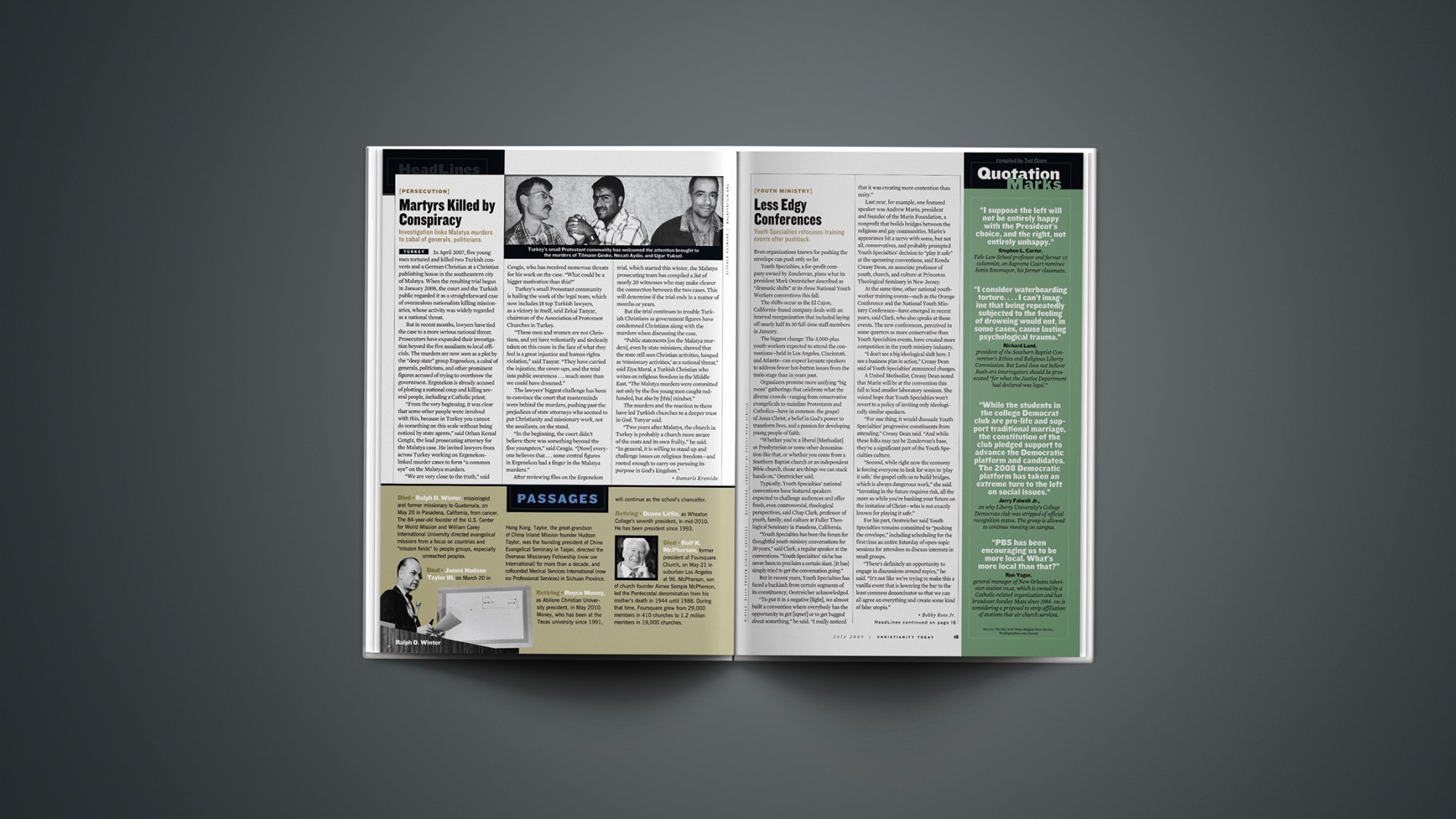Even organizations known for pushing the envelope can push only so far.
Youth Specialties, a for-profit company owned by Zondervan, plans what its president Mark Oestreicher described as “dramatic shifts” at its three National Youth Workers conventions this fall.
The shifts occur as the El Cajon, California-based company deals with an internal reorganization that included laying off nearly half its 30 full-time staff members in January.
The biggest change: The 3,000-plus youth workers expected to attend the conventions—held in Los Angeles, Cincinnati, and Atlanta—can expect keynote speakers to address fewer hot-button issues from the main stage than in years past.
Organizers promise more unifying “big room” gatherings that celebrate what the diverse crowds—ranging from conservative evangelicals to mainline Protestants and Catholics—have in common: the gospel of Jesus Christ, a belief in God’s power to transform lives, and a passion for developing young people of faith.
“Whether you’re a liberal [Methodist] or Presbyterian or some other denomination like that, or whether you come from a Southern Baptist church or an independent Bible church, those are things we can stack hands on,” Oestreicher said.
Typically, Youth Specialties’ national conventions have featured speakers expected to challenge audiences and offer fresh, even controversial, theological perspectives, said Chap Clark, professor of youth, family, and culture at Fuller Theological Seminary in Pasadena, California.
“Youth Specialties has been the forum for thoughtful youth ministry conversations for 30 years,” said Clark, a regular speaker at the conventions. “Youth Specialties’ niche has never been to proclaim a certain slant. [It has] simply tried to get the conversation going.”
But in recent years, Youth Specialties has faced a backlash from certain segments of its constituency, Oestreicher acknowledged.
“To put it in a negative [light], we almost built a convention where everybody has the opportunity to get [upset] or to get bugged about something,” he said. “I really noticed that it was creating more contention than unity.”
Last year, for example, one featured speaker was Andrew Marin, president and founder of the Marin Foundation, a nonprofit that builds bridges between the religious and gay communities. Marin’s appearance hit a nerve with some, but not all, conservatives, and probably prompted Youth Specialties’ decision to “play it safe” at the upcoming conventions, said Kenda Creasy Dean, an associate professor of youth, church, and culture at Princeton Theological Seminary in New Jersey.
At the same time, other national youth-worker training events—such as the Orange Conference and the National Youth Ministry Conference—have emerged in recent years, said Clark, who also speaks at those events. The new conferences, perceived in some quarters as more conservative than Youth Specialties events, have created more competition in the youth ministry industry.
“I don’t see a big ideological shift here. I see a business plan in action,” Creasy Dean said of Youth Specialties’ announced changes.
A United Methodist, Creasy Dean noted that Marin will be at the convention this fall to lead smaller laboratory sessions. She voiced hope that Youth Specialties won’t revert to a policy of inviting only ideologically similar speakers.
“For one thing, it would dissuade Youth Specialties’ progressive constituents from attending,” Creasy Dean said. “And while these folks may not be Zondervan’s base, they’re a significant part of the Youth Specialties culture.
“Second, while right now the economy is forcing everyone to look for ways to ‘play it safe,’ the gospel calls us to build bridges, which is always dangerous work,” she said. “Investing in the future requires risk, all the more so while you’re banking your future on the imitation of Christ—who is not exactly known for playing it safe.”
For his part, Oestreicher said Youth Specialties remains committed to “pushing the envelope,” including scheduling for the first time an entire Saturday of open-topic sessions for attendees to discuss interests in small groups.
“There’s definitely an opportunity to engage in discussions around topics,” he said. “It’s not like we’re trying to make this a vanilla event that is lowering the bar to the least common denominator so that we can all agree on everything and create some kind of false utopia.”
Copyright © 2009 Christianity Today. Click for reprint information.
Related Elsewhere:
Christianity Today has a special section on youth on our site, including:
It’s Never Been about the Abstinence Pledge Itself | Researchers should ask what causes teens to abstain, not whether a public vow is a magic bullet. (January 23, 2009)
Taking Slackers to Task | Teen twins Alex and Brett Harris call their peers to something more. (October 21, 2008)
Gospel Talk | Entire area Young Life staff out after evangelism mandate. (January 7, 2008)
See our news section and liveblog for more news updates.










